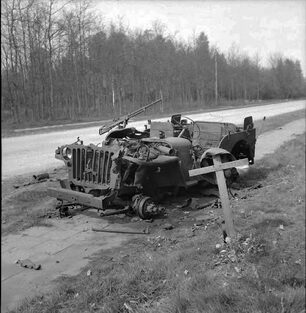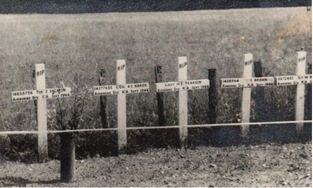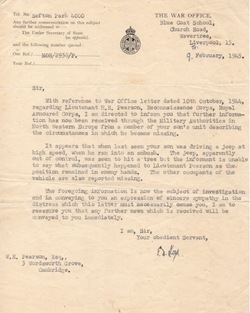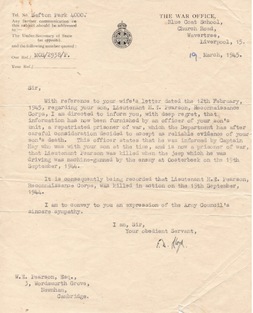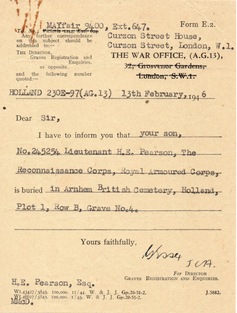- Home
- About The Project
- About The Author
- Latest additions to the project
- Operation BULBASKET
- Oradour-Sur-Glane Massacre 10 June 1944
- British Normandy Memorial
- John Northend - The Inspiration
- Lancaster W4192 "QR-E" 61 Squadron RAF
- The Cemeteries; UK, Ireland and European mini-tour
- Aarestrup Kirke, Denmark
- Aarestrup Kirke - Loss of Liberator KH410
- Aarhus Vestre Cemetery, Denmark
- Arnhem Oosterbeek Cemetery, Holland
- Basingstoke, Wortley Road Cemetery
- Bayeux War Cemetery, France
- Church Of Ireland Churchyard, Belturbet, Republic of Ireland
- Bergen-Op-Zoom, Netherlands
- Bretteville-sur-Laize Canadian War Cemetery
- Brookwood Military Cemeteries
- Cambridge American Cemetery
- Cranwell, St Andrews Parish Church
- D-Day Gold Beach - Remnants of Mulberry Harbour
- Deutsche Soldatenfriedhof, Cannock Chase
- Deutsche Soldatendfriedhof La Cambe, Normandy
- Dunkirk Town Cemetery, France
- Enniskillen Roman Catholic Cemetery
- Escoublac-La Baule War Cemetery St Nazaire
- HAMEL MILITARY CEMETERY, Somme Department, Northern France
- Harefield St Mary's ANZAC Cemetery
- Royal Victoria Hospital Netley and Military Cemetery, Southampton
- Nijmegen Jonkerbos War Cemetery
- Northwood Cemetery
- Odense Assistens Cemetery, Denmark
- Poperinghe New Military Cemetery, Belgium
- Ranville Churchyard, France
- Ration Farm Cemetery, Chapelle D'Armentieres, France
- Reichswald British War Cemetery, Germany
- Runnymede Commonwealth Air Forces Memorial
- Scopwick Burial Ground, Scopwick, Lincolnshire
- Sleaford Cemetery
- Sainte Marè Église
- CWGC Eyes On, Hands On Volunteer Programme
- Biography Flight Sergeant Eleanor Maud Barker WAAF
- Biography Commandant Roger Baudoin French Foreign Legion
- Biography Trooper George Sydney Herbert Biffin B Sqn 1 SAS
- Biography Lance Sergeant Charles Frederick Bristow GM RE
- Biography Lt HD Brotheridge Ox & Bucks Light Infantry
- Biography L/Cpl William Harold Coltman VC DCM* MM*
- Biography Lieutenant W H England No 48 RM Commando
- Buffalo LVT 'Conqueror' destroyed at Walcheren.
- Biography Pilot Officer Emil Fechtner RAF (Czech)
- Biography Private Oswald Fisher 2nd RM Bn, RN Division, RMLI 1916
- Biography Lt Col J G Fitzmaurice MC Royal Tank Regiment
- Biography Flight Sergeant Josef František DFM* RAF
- Biography Sergeant Pietro Alfredo Giovetti RAFVR
- Biography Lieutenant John Grayburn VC, 2 Para
- Biography Lt Cdr Nicodeme Guilonard Netherlands Navy
- Biography Major The Viscount Arthur Onslow Edward Guinness, Viscount Elveden.
- Biography Captain PH Haydon DSO No. 41 RM Commando
- Biography Private Owen Hooper, The Buffs & 4 Commando
- Biography Lieutenant Joseph Patrick Kennedy Jr. US Navy
- Biography Oberstleutnant Walter Koch, Kommandeur Fällschirmjaeger-Regiment 5
- Biography Flight Lieutenant DSA Lord VC RAF
- Biography Major Robert Reid Maitland MB CHB RAMC
- Biography Wg Cdr Jaroslav Maly RAF
- Biography Lieutenant Colonel William McDowell DSO BSc RE
- Biography Flying Officer Geoff Adrian Mombrun RAFVR
- Biography Marine Byron Moses No. 41 RM Commando
- Biography Flying Officer J E Northend RAFVR
- Biography Group Captain 'Bobby' Oxspring DFC** AFC RAF
- Biography FO Ludwik Witold Paszkiewicz DFC RAF
- Biography Lieutenant HE 'Jimmy' Pearson MC The Reconnaissance Corps
- Biography Pilot Officer Harold Edwin Penketh RAFVR
- Biography Rifleman Frank Pennefather, 3rd NZ Rifle Brigade
- Biography Sergeant Robert John "Jack" Preece, 61 Squadron RAF.
- Biography Lieutenant John Richard Priestley The Rifle Brigade
- Biography Staff Sjt Christopher Robinson Glider Pilot Regt., AAC
- Biography Private AMB Roozeboom No 10 (I-A) Cdo
- Biography Sepoy Mahrup (Mahruf) Shah 129th Duke of Connaught's Own Baluchis
- Biography Flying Officer Burrell AT Soundy RNZAF
- Biography Private James Stokes VC 2nd Bn KSLI
- Biography Lieutenant Colonel Leon Robert ‘Bob’ Vance, US Army Air Force
- Taking Chance. The importance of remembrance.
- Useful Links- Museums and Websites
- MA FINAL PROJECT
Lieutenant Hubert Ellis 'Jimmy' Pearson MC The Reconnaissance Corps
|
Rank |
Lieutenant |
|
Name & Decorations |
Hubert Ellis (Jimmy) Pearson MC |
|
Service |
British Army |
|
Unit |
HQ Troop 1st Airborne Reconnaissance Squadron, The Reconnaissance Corps |
|
Attached To |
British 1st Airborne Division |
|
Operation |
Operation Market Garden |
|
Date of Death |
19th September 1944 |
|
Place of Death |
Arnhem Bridge |
|
Circumstances |
Killed in Action |
|
|
|
|
Age |
23 |
|
Buried or Commemorated at |
Arnhem Oosterbeek War Cemetery |
|
Grave or Memorial Number |
Plot 1 : Row B : Grave 4 |
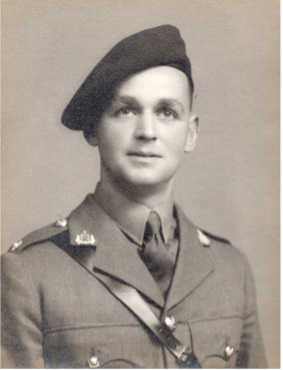
Source: https://www.pegasusarchive.org/arnhem/Biog3/Hubert_Ellis_Pearson_1.htm
Hubert Ellis Pearson was born in 1921, the son of William and Dora Pearson of Cambridge. From 1930 to 1940, he was educated at Silcoates School, Wakefield, Yorkshire, then subsequently attended St. Edmund Hall, Oxford. On the 19th September 1942, he was granted an emergency commission as a Second Lieutenant in the Reconnaissance Corps of the Royal Armoured Corps. In September 1942, "Jimmy" Pearson, as he was always known, was an early volunteer for the then 1st Air Landing Squadron, Reconnaissance Corps, and became a Section Commander in "B" Troop.
Promoted to War Substantive Lieutenant on the 19th March 1943, he served in North Africa and then Italy, disembarking at Taranto on the 9th September. "B" Troop proceeded to reconnoitre towards Locorontondo, and had two encounters with the enemy between that town and the village of Martina Franca during the early morning of the 10th September. The Troop suffered heavily in the second encounter, losing three men killed and several taken prisoner, including Lieutenant Pearson. He escaped from the train carrying him north, but despite being quickly recaptured he managed to get away again, and after many months successfully reached the Allied lines with Lance-Corporal Hynes in June 1944. On the 26th July 1945, it was announced in the London Gazette that he had been awarded the Military Cross for his activities during this period. His citation reads:
Lieutenant PEARSON was taken prisoner at TARANTO on the 9th September 1943. During transit north in an electric train, the occupants of his truck broke it open with a piece of iron concealed from the guards. Only six men had jumped when the escape was detected. Although the wagon was surrounded by wire and guards rode on the steps, the remainder of the prisoners-of-war unscrewed the ventilator at the bottom end of the wagon, just above the buffers. With two other paratroopers, Lieutenant PEARSON jumped as the train was slowing down to enter ROVIGA station, but the three were caught by Fascists soon afterwards and sent to a former Infantry barracks at PADUA.
Again they were entrained and before the journey commenced had made, with knives, a small hole in the side of the truck. Fifteen men jumped out north of VICENZA under fire from guards in the next truck. With two Other Ranks, Lieutenant PEARSON proceeded to PORTO CHIOGGIA, and when evacuation by sea proved impossible, returned to the mountains. Later attempts were made to cross the lines at CASTEL DI SANGRO and ALFEDENA, but each was defeated by enemy defences. Returning to the ASCOLI area, they waited for the Allied advance and reported on the 19th June 1944.
During January 1944, with another officer, Lieutenant PEARSON distributed to prisoners-of-war assistance dropped by parachute and provided through the ROME organization. Although he tried to form a contingent of prisoners-of-war to help a local band of patriots, the offer was not welcomed and the rebels were dispersed before the idea matured.
On the 22nd June 1944, he reported to British troops who had reached ASCOLI PICENO, having helped to keep order at a nearby village.
Another prisoner-of-war remarked on the fine example displayed by Lieutenant PEARSON in planning escapes and encouraging others to try also. Due to his leadership, many prisoners-of-war escaped.
Pearson wrote to Major Gough in July 1944, to inform him that he and Hynes had escaped, and immediately after arriving in the UK on the 12th August 1944, telephoned him to say that he had returned was ready for duty. Although allowed on survivors leave, he had made it clear that he wanted to be involved in any future operations that the Squadron would be involved in, and Gough found a place for him as the commander of a 'spare' jeep crew in Headquarters Troop.
During Operation Market Garden, Lieutenant Pearson flew to Holland with the first lift on Sunday 17th September 1944. Following the losses suffered by "C" Troop as they encountered Battalion Krafft during their attempt to reach Arnhem Bridge, Pearson volunteered to join them, and remained in the area of the landing zones throughout the 18th September. On the following day, he took part in the reconnaissance mission to the Ede - Arnhem road to the north of Wolfheze, but during their return the Troop was ambushed on the road running through the woodland at Planken Wambuis, and Pearson was killed when his jeep was shot up. He was 23, and was first buried in the Temporary Military Cemetery near Ginkel Heath, beside Verlengde Arnhemseweg, but now lies at rest in the Arnhem/Oosterbeek War Cemetery, Plot 1, Row B, Grave 4.
Pearson prepared the following letter to his mother on the 25th April 1943:
Dear Mother,
I hope this will make you feel a little better, now that it has actually happened. I can't write all I feel, but I do want to say "Thank you" to all of you - you have all been so very kind to me. Please just remember two things, which I mean in all seriousness - I do not regret in the least the line I have taken and should do the same again if necessary. Like you, I do not believe this is the end - somewhere I shall see you all again. Turning to more material things - I have not bothered to make a will; please use the money I have in Glyn Mills Bank (now £60) to help any children Mary may have after this is over. Well, Mother, we are off very soon now - where, I can only guess. But I go with the grandest set of chaps anyone could wish to have and in the hope that this time it will not be in vain. So, Goodbye to you all. I am thinking of you all again. Hubert.
Captain John Hay, the commander of "C" Troop, wrote a letter to Pearson's father on the 25th April 1945, and the subsequent report, apparently written by Hay in the third person, followed on 30th April:
Dear Mr Pearson,
I got back to this country last week and came out of hospital the other day. I will try and tell you what happened to Jimmy. As you know we tried to make a break for it down a main road about 8 miles from Arnhem. Jimmy and I were in the leading jeep, Jimmy driving. After about ½ a mile we came on a bunch of Germans in the trees by the road. They were completely surprised and we got by all right! Unfortunately there were some more further down the road, who, having heard the firing, were ready for us. I was hit, and immediately afterwards Jimmy must have been hit, as the jeep left the road out of control and turned over. I saw Jimmy lying about 5 yards away and called to him, but got no reply. The Germans then came up and pulled me out. I asked them about Jimmy, who had not moved, and one of them went to him, but came back and said he and the other man in the jeep were both dead. I think there can be no doubt that Jimmy was killed outright in the jeep. I know how you must feel, as he had only just got back from Italy, but it was just like him to volunteer to come with all his friends, and I was very pleased when he attached to my Troop; he was a terrific help. Please do not hesitate to let me know if there is anything else I can tell you.
Sunday, 17 Sept 44.
2 p.m. Jump at Arnhem. Jimmy found Hay at Rendezvous. (Dug in). Moved off 3 p.m. to Wolfheze. Occupied slit trenches, protecting Brigade H.Q. nearby, big house burning. Dutch very good. I noted (house or hospital) burning at W. [Wolfheze] "Nurses seemed very glad to see us & they gave us apples and hot tea", on the Sunday evening when their place was burning. During Sunday night, Hay, with some men, went to look for Bell [Brumwell?] & party, who had made first contact with enemy. (Original orders were to go to Arnhem Bridge, Jimmy & one man detailed to cut wires if bridge mined; but enemy held up the movement). Hay during Sunday night reconnoitring, found bodies of Bell [Brumwell?] & others. While Hay absent, Jimmy was left in charge.
Monday morning.
Jimmy went with Hay & men & brought in bodies of Bell [Brumwell?], Peter Bucknall and 4 others. They dug a grave at Wolfheze and burial service was conducted by a Padre. Monday - later - 2 patrols were sent out, Jimmy leading one. Returned about 3 o/c & reported had seen the Germans without being seen (20 or 30 Germans). Jimmy lay in scrub & heather & saw Germans pass close by. Much firing near at hand during the night, but Hay's Troop spent a quiet night at Hotel at Oosterbeek, Brigade H.Q. which they were told off to guard.
Tuesday morning.
Good breakfast - hot tea and dehydrated porridge. About 8 a.m. sent on Reconnaissance. First, North across railway line to cross-roads, there seen by Germans & mortar fire, returned towards Oosterbeek. F.W. I90's (German fighters) attacked - no casualties, took refuge in slit trenches (ready made) until air attack ended. Back to Oosterbeek, then followed another route, joining main road to Rotterdam, about 3 miles N.W. of Wolfheze. Man came from rear reported had been shadowed - (wooded country with stretches of heath, like Aldershot district). Could see Germans in woods; realised surrounded. Hay consulted with J [Jimmy] & two other officers - decided to attempt to break out at high speed. Gave orders, if any jeep hit, others must not stop. Hay's letter tells the rest of the story.
No chance for proper meals - depended upon the 24 hours emergency rations - also chocolate & biscuits, when they could.
One man (prisoner) back in England, Bowles (????)
Scene of action 19th Sept. 6 miles W. of Arnhem in Wolfhaze or Wolfhezen. Spot 2 m. N.W. of Wolfhaze on main road. Other men in leading jeep, Trooper Brawn (Wireless Operator), nothing more known of him.
Hay & Jimmy were together in N. Africa at Mascara & latter at Sousse. Job on runway, marshalling gliders, shared tent.
In July 1973, Edwin Waring, aka Lance-Corporal Frank Hynes, who escaped from Italy with Pearson, submitted the following to the Pegasus Journal:
On the second [Note: third] day of the Arnhem operation a young Lieutenant, 1st Airborne Reconnaissance Squadron was presumed killed (September 1944). He was head boy, captain of Cricket and Rugger and the hero of all the younger boys at his school. (Silcoates School of St Edmund's Hall, Oxford). His inspiring leadership at that school had been invaluable. He was always trying to force a win from the start of any game. His Headmaster said, "We look for great things from him in the future". Well, he did not look in vain.
Perhaps I am the only one who knows the full story of that annoying chapter in Italy when he twice broke from his captors. Together we unscrewed the 'vent' plate of a cattle truck after being taken prisoner near Bari in September 1943. We jumped from the train buffers and made good our escape. The escape was planned by Pearson who felt he must not let Freddie Gough down, "We must get back to our unit", he said. The lads of the Reconnaissance who had been led by him were proud and glad he had returned, tired, injured and footsore, to lead them again.
To sum up the history of this brave, gallant officer, I quote from a House Magazine, "To an Old Boy Killed In Action".
I can remember how, when June's steep-diving
sun and cricket's minuet, slow pacing,
made ballet-dance of white and blue and green,
a trick of flight deceived you, bowled you clean,
just when we thought to see the deep-field chasing
like Atalanta in the race, your driving.
And I remember how you laughed in trying
to discern your fault in cut or hook:
and as I see you in that simple game,
so I can see how, cavalier, you took
the bullet in your brain and laughed at dying.
Major Gough replied to this letter with:
I was very interested in the article by Edwin Waring on the subject of Jimmy Pearson, who was killed in an ambush whilst he was striving to make his way to the bridge at Arnhem [Note: incorrect, as explained above]. Reference is made quite rightly to his “inspiring leadership”, as this was the hallmark of his character.
'Jimmy' Pearson joined the 1st Airborne Reconnaissance Squadron whilst we were in Newbury and his athletic prowess was the first thing to manifest itself. He was a brilliant rugby player, having won a war-time Blue at Oxford, and he represented the Airborne Division - as it was then called - in a series of fantastic victories while we were training at Bulford. Not only did we give the Guards Armoured Division a 40-point thrashing, but we also defeated the full strength of the Royal Air Force in a splendid match played at Richmond, from which the R.A.F. Benevolent Fund and the Airborne Forces Security Fund shared a substantial gate.
Edwin Waring very rightly refers to the time when he and 'Jimmy' were "on the run" in Italy in late 1943. For his exploits during that period 'Jimmy' Pearson was awarded the Military Cross, and he reported back to the Squadron at Ruskington at the beginning of September 1944. When he heard about "Market-Garden" - and although he was due for a well-earned leave - he pestered me until I agreed to take him with us to Arnhem, where he was killed. I feel that he would have died of a broken heart if we had left him behind.
Those of us who survive know what the country owes to the many young men who, like 'Jimmy' Pearson, were proud to wear the Red Beret and give their lives for their country.
The following tribute to Lieutenant Jimmy Pearson by his old school was printed in The Silcoatian in April 1945:
Hubert Pearson is now posted as 'Presumed Killed'. There are those still in the School who knew him as their Head Boy, Captain of Cricket and Rugger, and probably and naturally, their hero. Pearson was good at whatever he turned his hand to, but not always without hard effort and painstaking attention to detail. In his great success (starting so far as games are concerned when he was so young that anyone would have excused him if his head had been turned) he was always quietly unassuming and he genuinely disliked any fuss to be made or tribute paid. He was much more than merely a fine all round athlete and a first-rate Captain: he was a fine fellow and a born leader. Unlike some born leaders, he led always in the right direction, and sometimes so unobtrusively that people did not even know that they were taking a course of their own volition. It would be invidious here to detail all his triumphs at School or at St. Edmund Hall, Oxford, where he spent one all too short year. But we would like to reprint what F.P. Lusted wrote of him in "The Silcoatian" at the end of the triumphant 1939 Cricket Season:
'This success owes so much to the play and leadership of our Captain, H.E. Pearson, that the term must not close without an appreciation. His actual scores made and wickets taken speak to a certain extent for themselves, but mere figures are feeble in an attempt to show his worth. We have seen his fighting efforts for quick runs and his control of the game when he scored 79 out of 85 for the last wicket: and his taking of wickets when it was only necessary for the opponents to last out for a few minutes in order to escape defeat. More than most personal efforts, his inspiring leadership has been invaluable. Always trying to force a win from the start of the game, and never afraid to take risks, he has had the success he deserved. He has changed his bowling so well that opponents hardly ever looked 'set' and has given an example in the field which has been followed by most of the side. He has varied his field to combat individual batsmen's strokes with intelligence and has kept the whole field keen.' (One remembers vividly that this tribute fell into Pearson's hands in manuscript when he was being consulted about the cricket report in the Magazine. "Must this go in?" he said, puckering with distaste his sometimes simian countenance in the familiar way, "It was the team, you know".)
One remembers how he was called to leave his own beloved House to take over command of another left without a leader; how sad he was though he spoke of it to no-one, and how his new charge went ahead from that moment. One remembers how, though no great actor, he gave himself completely to the job of putting up a good show even in the cricket term and one remembers him in his first part, a pathetic German prisoner, in Journey's End, and, joyously idiotic, in his last part, Charley's Aunt in the play of that name.
A glance through the 'Silcoatian' in those days finds his name everywhere, in every walk of School life: Sports Champion, breaker of records, swimmer, "In the Fives House Championship Pearson has so dominated the play that his House, Haworth's, have easily won the Championship." When old George Hirst visited Wakefield and bowled against the Silcoates representatives sent down, he said that the only criticism he had to make of Hubert was that he had no Yorkshire qualification. In Hubert's last term there appeared this Editorial comment: "It is right that we should here set on record our appreciation not only of his fine achievements both on the Rugby and Cricket fields, but of a captaincy which has done so much to make our record in both games in the last two years so memorable. The same qualities showed in his leadership of the School as Head Boy. We look for great things from him in the future, only trusting that circumstances beyond his and our control do not interfere seriously with future achievements of which the School may with reason expect to be proud."
Well, we did not look in vain. Probably even his parents do not know the full story of that amazing chapter in Italy when he twice broke from his captors (it must have been a tough moment for the Herrenvolk, the moment before he was taken prisoner that day near Bari in September '43) and of his trek after his second escape in October from a train bound for Germany, making his way to British lines the following June... "we tried all ways of passing the front by boat, by foot, and even had an aeroplane scheme prepared. Jerry began moving out two weeks ago, and we sat on top of the mountains and laughed and cheered his infantry on as the poor devils straggled back. I am on my way down now to get a boat back home (I hope!) and I stand a good chance, as the Div, is back there now... Great news from France isn't it... P.S: 9 months without tea!" When he did get home, he could easily have stayed there. He had a very long leave due, like all returned P.O.W. But the sublime Arnhem job was afoot and his Division went and he insisted on going too. Of course. There were 'great things for him in the future.' The greatest. You who have been led by him will know how glad his men must have been to have him back to lead for the last time, into that matchless adventure.
From his former Headmaster.
Hubert Pearson was lent to Silcoates for ten splendid years. It is very difficult for those to whom he was dear to speak about him.
But the School owes him a great and undischargeable debt. His wise leadership of every branch of its life for so many years has left a mark quite ineffaceable. In dozens of ways he created tradition. Lapse of time may erase the connection between the tradition and his name, but those who lived with him will always know how boldly, though unassumingly, he wrought in those later nineteen-thirties. And, better still, many in distant places, years after School has been left behind, will be taking decisions along the lines: "No! I can't do that. Jimmy would never have done it."
He never found class-work easy work, but because it was right to do it, it was done, and well done. But essays and syntax and a healthy mind formed only one side of a complete life, they were never allowed to seal his horizon. What an exposition, year-long and rare and fascinating, he gave us of the corpus sanum! Who will ever forget his coming in to bat for the 1st XI when his bat and he were approximately of equal length? How graceful and thorough were his fielding, his Rugger, his running, his captaincy! To pick out only a quartette of items from his enviable sportsman's repertoire.
But Juvenal's healthy mind in a healthy body were not enough for Hubert: life had another dimension. As he grew older, he understood people better. He saw how leadership implies a cheery word to the nervous, a warning word to the slacker, a job for the timorous, and above all, a personal example of a life controlled, cleanly, enthusiastic for everything of good report. That, the most precious of all donations a school can receive, he gave us, liberally, generously, pressed down, running over.
Our sympathy goes to the three at home, but he was ours, too; with them we sorrow. And we rejoice! For he is our assurance that though men are often baffled to fight better, right triumphs, goodness wins and endures, the pure in heart see their Lord. S.H.M.
From the "Old Boys' Section".
After anxious months since September, when he was reported 'Missing believed killed' 8 miles north of Arnhem, Hubert (Jimmy) Pearson (1930-40), 1st Airborne Reconnaissance, is now posted as 'Presumed Killed'. Jimmy was the flower of a fine generation of Silcoatians (how he would hate to be described) and though S.H.M. has written elsewhere in this number of him, very finely, we would add this anonymous tribute, in the name of all who knew him. There cannot be a Silcoatian the poorer for knowing him: many owe him a deep debt they cannot pay, even if he is found alive. His father and mother should know that the dominant emotion of Silcoatians is pride rather than grief: pride in his character and achievement, pride in being part of that which went to make him.
My thanks to Bob Hilton and Peter Cablis for this account.
